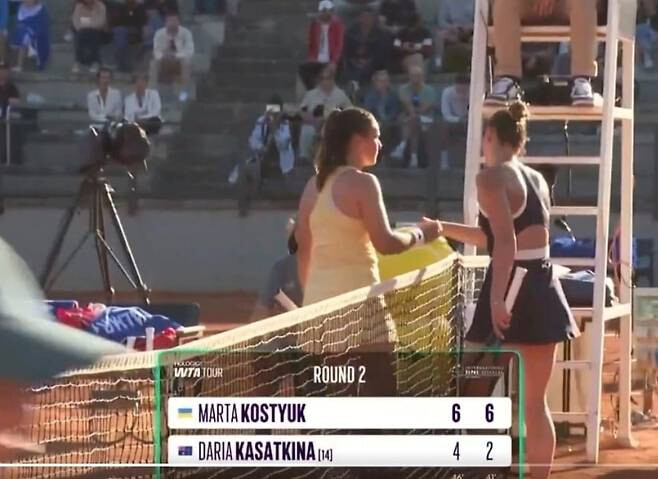
ROME, ITALY - In a poignant display of human connection amidst the ongoing conflict in Ukraine, tennis transcended the boundaries of nationality and political tensions. Daria Kasatkina, a former Russian player who recently acquired Australian citizenship, shared a warm handshake with Ukraine's Marta Kostyuk after their second-round match at the BNL Italy International on Thursday. The gesture resonated deeply across the globe, highlighting a moment of empathy in the shadow of war.
Since Russia's invasion of Ukraine in 2022, Kostyuk has maintained a firm stance of refusing to shake hands with Russian and Belarusian players. This principled decision underscored her unwavering opposition to any interaction with athletes representing the aggressor nation. Her stance often broke with the traditional post-match handshake etiquette in professional tennis, drawing significant attention.
However, following her 6-4, 6-2 victory over Kostyuk, Kasatkina was met with an unexpected gesture of goodwill. Kostyuk approached the net and extended her hand, initiating a handshake that went beyond mere sportsmanship. It was a powerful symbol of human understanding and solidarity emerging from the tragic backdrop of war.
This significant moment was contextualized by Kasatkina's recent decision to change her citizenship from Russian to Australian in March. This move was widely interpreted as a clear denouncement of Russia's aggression against Ukraine. Kasatkina had previously voiced her criticism of the invasion, even facing backlash within Russia for her outspoken stance.
Prior to the match, Kostyuk had hinted at a possible change in her usual protocol, expressing respect for Kasatkina on social media. She stated, "I haven't shaken hands with Russian, Belarusian players since the war started. However, I respect those who aren't silent, who call things by their names and act accordingly." This acknowledgment signaled her support for Kasatkina's courageous actions.
After the match, Kostyuk reiterated her sentiments, saying, "I was happy to shake hands with a respectful athlete. I stand with those who speak out and act, even when it's the easier option to remain silent." For Kasatkina, facing Kostyuk marked her first encounter with a Ukrainian player since her change of nationality, making the handshake even more meaningful for both athletes.
The handshake between Kasatkina and Kostyuk carries a significance that extends beyond the tennis court. It demonstrates the potential for human connection and empathy to prevail even when nations are deeply divided by conflict. Kasatkina's change of citizenship represents a clear condemnation of Russia's actions, while Kostyuk's handshake can be seen as an act of acknowledging and respecting that courageous stance.
The tennis world, like many other international platforms, has grappled with the participation of Russian and Belarusian athletes following the invasion. Debates surrounding their eligibility and the use of national flags have been ongoing, with various tournaments implementing different measures, including outright bans or allowing participation under neutral status. Against this backdrop, players like Kostyuk's initial refusal to shake hands served as a way to highlight the severity of the war and honor its victims.
However, Kasatkina's situation introduces a new dimension to this dynamic. It suggests that individual political beliefs and actions can transcend national identity, and that such courageous stances can earn the respect and solidarity of athletes from opposing nations. This moment underscores the potential for sports to be more than just a competitive arena, serving as a platform for affirming and promoting human values and unity.
While this handshake may not represent the views of all Ukrainian athletes, many of whom continue to refuse interaction with Russian and Belarusian players as a way to express their pain and anger, the moment between Kasatkina and Kostyuk offers a hopeful message of potential empathy and solidarity amidst the tragedy of war.
The significance of this event resonates beyond the sports world. It suggests that even in times of intense international conflict, individual courage and the recognition thereof can open doors for understanding and connection. The "historic handshake" between Kasatkina and Kostyuk will undoubtedly be remembered as a powerful moment, illuminating a beacon of hope and reaffirming human values in the shadow of war.
[Copyright (c) Global Economic Times. All Rights Reserved.]






























